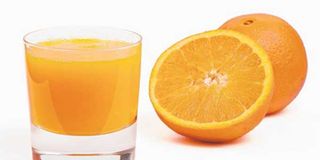Clinical Nutritionist Sona Parmar explains why she’s not a fan

A liquid diet made up entirely of fruit and vegetables has got to be the most efficient way to lose weight, right?. PHOTO | FILE
What you need to know:
- Perhaps, most importantly, although I’m an enormous fan of fruit and vegetables, I’m not sure that juice fasting is actually healthy.
- Despite all the vitamins and antioxidants you’re getting from all the fresh fare, you’re also exposing your body to lots of fructose (particularly if the juice is mostly fruit – 250ml of orange juice contains about three times as much fructose as a whole orange).
A liquid diet made up entirely of fruit and vegetables has got to be the most efficient way to lose weight, right? Hmmm, not quite. Turns out, whatever weight you lose, you’ll put back on as soon as you start eating solids again (usually after five days).
You’re also doing your body a huge disservice by trying to lose weight that way. By consuming few calories to support your energy needs, your body thinks that it’s starving and slows down its metabolic rate (the rate at which you burn calories). So, not only do you put on the weight when you start eating solids again, but the rate at which you burn them off is slower than before you were on the diet!
But what do you do if you want to go on a juice fast as a way to detox, and what should you know? You have to be pretty committed to stick with it. You will get hungry. Very hungry. In the name of research, I tried it for a day and nearly gnawed off my own arm. I lie - I drank fresh carrot juice after starting my day with porridge and still felt like a ravenous rodent by 4pm. But I digress.
The vast majority of people who go on a juice fast also experience an excruciating migraine-like headache known as a “detox headache”. These are actually withdrawal symptoms from the caffeine, sugar, nicotine, alcohol that you are now cutting out. Lots of water does help though. You may also feel weak and disoriented (low calorie intake and the type of calories). If you suffer from diarrhoea, however, you should stop immediately as it can lead to dehydration and electrolyte loss.
Perhaps, most importantly, although I’m an enormous fan of fruit and vegetables, I’m not sure that juice fasting is actually healthy. Despite all the vitamins and antioxidants you’re getting from all the fresh fare, you’re also exposing your body to lots of fructose (particularly if the juice is mostly fruit – 250ml of orange juice contains about three times as much fructose as a whole orange).
While fructose doesn’t inflate levels of sugar or insulin in your body, it does raise levels of blood fats called triglycerides (an important risk factor for heart disease). Fructose also lowers leptin – a hormone that has appetite-suppressing effects and is believed to play an important part in the regulation of food intake. It helps to explain why feeding animals with fructose has been found to cause them to eat more and gain weight – hardly the desired outcome of your juice fast.




